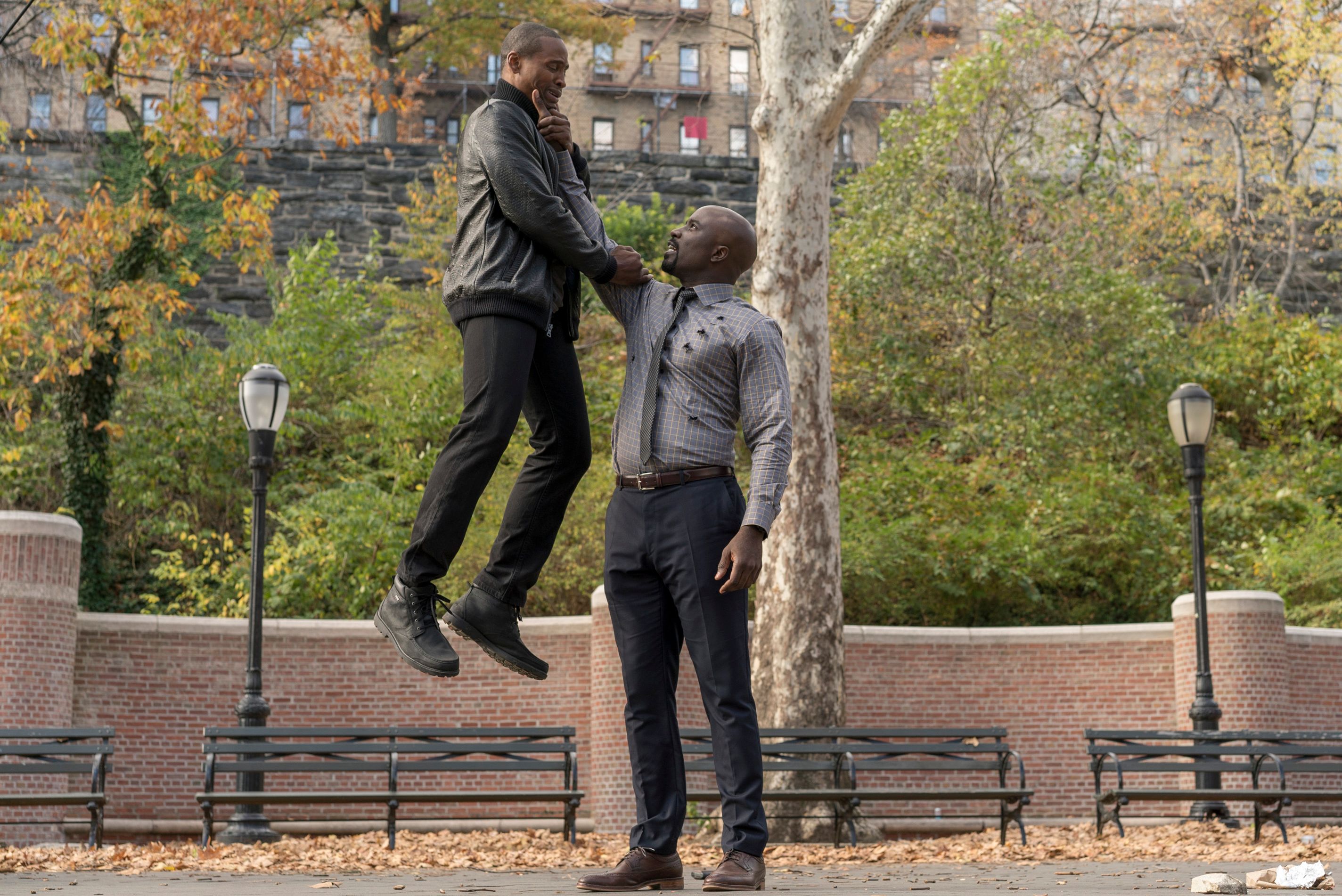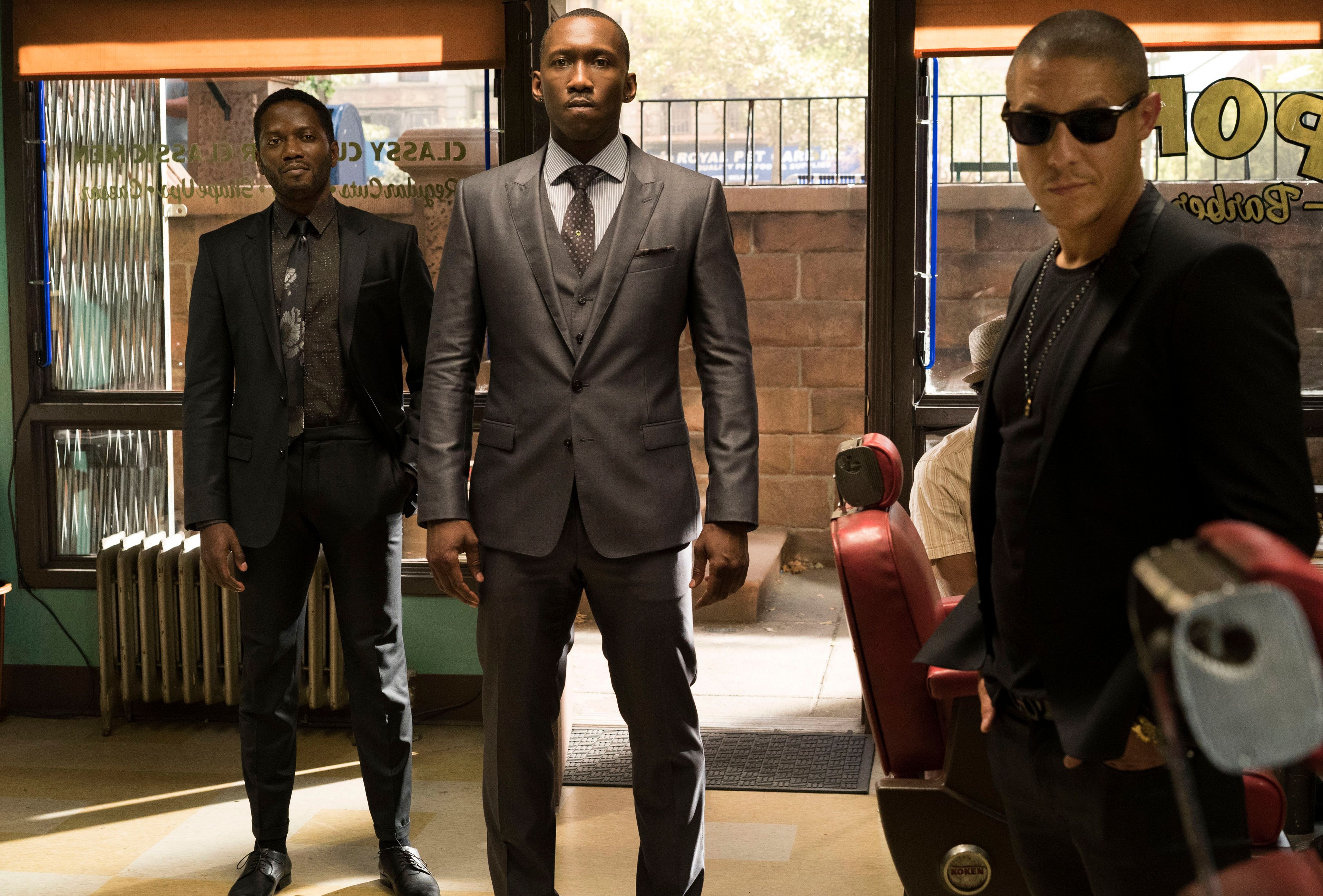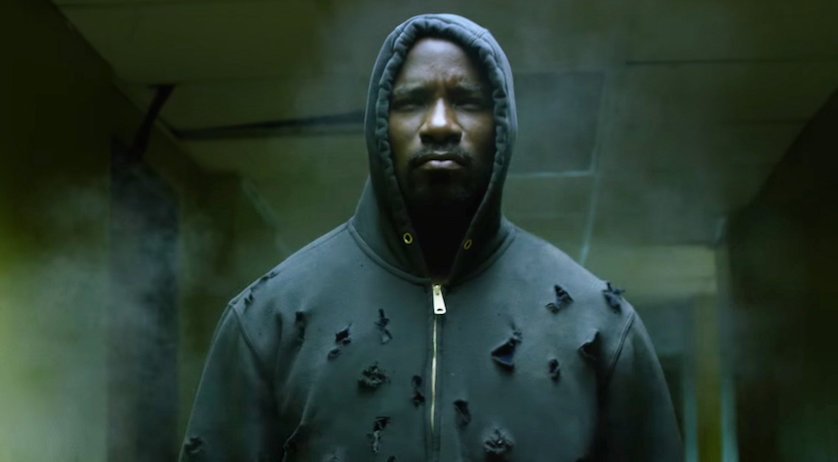
“How about we grab some coffee?”
(SPOILER WARNING!)
(Disclaimer: I apologize, folks, for this post being super, super, super late. I realize that it took me quite a long time to finish this show compared to the other Marvel Netflix shows. I had watched the first four episodes of this back when it premiered before other commitments, namely school and some of the other projects that I was working on for this site like the ‘Universal Monsters Retrospective’ and ‘Disney Month’, kept me from finishing it. Heck, I wasn’t even finished with it by the time that the fourth Marvel Netflix show, Iron Fist, debuted back on March 17th. So, with that in mind, I will try and get through Iron Fist before The Defenders comes out. But, until then, here is my long, long, LONG overdue review of Season 1 of Luke Cage. Also, unlike my reviews of Seasons 1 of Daredevil and Jessica Jones, I will be addressing a few major spoilers in this review. Since the show’s been out for a few months, I’d argue that it’s okay in this instance. Still, be forewarned if you haven’t seen the show yet!)
Marvel Studios has a track record that many other studios aspire to have. On the big screen, they have released 14 films since 2008 and have yet to make a ‘bad’ film, which is an even more impressive feat considering that they’re now in Phase Three of the Marvel Cinematic Universe. They’ve obviously come a long way since the original Iron Man and ever since the start of Phase Two, that success has also translated quite well into the TV market. Admittedly, it started off a little slow with the first season of Agents of S.H.I.E.L.D. but thanks to the big MCU twist set up in Captain America: The Winter Soldier, in which it was revealed that S.H.I.E.L.D. had been overrun by the villainous HYDRA organization, the show eventually managed to find its identity to help it stand out amongst its peers and is still going strong today in its fourth season. Marvel also had a solid critical hit on their hands with Agent Carter, which aired during the midseason breaks of Agents of S.H.I.E.L.D. Unfortunately, it got canceled after Season 2 due to low ratings. Ultimately, Marvel Studios’ biggest success so far in terms of the TV market has been their collaborations with Netflix. The online streaming service has allowed the studio to tell more mature, and as some would argue more layered, storylines that they couldn’t do on film. It all started with Daredevil, which finally gave fans of the ‘Man Without Fear’ a satisfying take on the character following the highly polarizing 2003 film adaptation. Then, there was Jessica Jones, which went the route of a noir story and, based on what I’ve seen online, has arguably been the most critically acclaimed project in the entire Marvel Cinematic Universe.
This year, Marvel’s Netflix division will have its biggest year yet. Just a few weeks back, the fourth Marvel Netflix series, Iron Fist, starring the titular character and final member of the impending Defenders team-up, premiered. Admittedly, it became the first MCU project to not receive good reviews but I’ll get into that when I review the show. This will then be followed by the highly-anticipated crossover series, The Defenders, which will be released sometime in the middle of the year. Later this year, the breakout character of Daredevil Season 2, Jon Bernthal’s Frank Castle AKA ‘The Punisher’, will get his own series. But first, let’s talk about Marvel Studios’ third Netflix series, Luke Cage, starring Mike Colter as ‘the man with the unbreakable skin’. Luke Cage first made his debut in Jessica Jones as a supporting role to Krysten Ritter’s titular main protagonist. Keeping true to the comics, the two began a romantic relationship but by the end of Season 1, it seemed as if they’d gone their separate ways after a major bombshell was dropped. Now, the one sometimes referred to as ‘Power Man’ headlines his own show, Luke Cage, developed by writer Cheo Hodari Coker, who’s written for shows like NCIS: Los Angeles and Ray Donovan. This time around, the action shifts from the gritty streets of Hell’s Kitchen to the soulful streets of Harlem. But, despite the change in location, the Marvel Netflix feel is still very much in effect and while not every narrative decision it makes works, in the long run, this first season is an electric start to another fantastic take on a classic comic character.

We were first introduced to Luke Cage (Mike Colter) in Jessica Jones as the owner of a local bar in Hell’s Kitchen. He and Jessica ended up getting romantically involved but that relationship turned sour when it was revealed that Jessica, albeit when she was under the control of the villainous Kilgrave, was responsible for the death of Luke’s wife Reva (Parisa Fitz-Henley). As this series begins, Luke has moved back to his hometown of Harlem and is keeping a low profile as a sweeper at reformed gangster Henry ‘Pop’ Hunter’s (Frankie Faison) barbershop and a dishwasher/occasional bartender at the nightclub ‘Harlem’s Paradise’, owned by crime boss Cornell ‘Cottonmouth’ Stokes (Mahershala Ali). One night, an arms deal involving Stokes’ men and some local boys from Harlem goes sour and Cottonmouth’s response to losing the money from that deal ends up affecting many of Harlem’s residents on a deep, personal level. Now inspired to stand up to Stokes, Luke embarks on a personal vendetta to set things right in the city, all the while the NYPD, specifically detective Misty Knight (Simone Missick), also try to take Stokes down. But as Luke finds out, there’s a lot more to this situation than expected, and he ends up crossing paths with other figures in Harlem during his quest for vengeance, including New York City councilwoman Mariah Dillard (Alfre Woodard), who happens to be Stokes’ cousin, and a shadow from Luke’s past who ends up bringing into play the only thing that could possibly take him down.
One of the coolest things about Marvel’s Netflix shows is that each maintains its own unique style that sets it apart from its sister shows. Daredevil is a martial arts action series while Jessica Jones, as stated earlier, is based in the genre of crime noir. As for Luke Cage, the best way I can describe its style is that… it’s just hip. One example of this? The music. Coker has gone on record stating that music is a key part of the series, even going as far as to name each of the season’s 13 episodes after songs by the band Gang Starr. Add in excellent musical performances that occur in Cottonmouth’s nightclub during a good chunk of this season’s episodes and you have arguably the most ‘stylish’ entry to date in Marvel’s lineup of Netflix shows. Switching from Hell’s Kitchen to Harlem provides a nice and refreshing new backdrop to the hip but gritty world of Luke Cage which, as many have pointed out, shares quite a bit in common with the hit HBO show The Wire. Admittedly, I haven’t seen that show (and yes, I know the consequences of saying that on the internet) but I still recognize the strong themes that are apparent in this show, including, of course, those relating to race. After all, we are talking about Marvel’s first TV series headlined by a black superhero, so there are quite a few moments in this that address current racial issues. This especially comes into play later in the season, when a particularly heated moment between a cop and a young black man results in an image that has unfortunately become very common these past few years. However, by giving us a terrific main protagonist to follow, the show handles these themes excellently, resulting in some very powerful emotional moments.

Now while the show has done quite well with critics, the consensus amongst them is that while the show starts out on a great note, it runs out of steam during the second half of the season. I’ll admit, though, that I didn’t really notice this while watching it. Overall, I thought that the season’s pacing was solid throughout. And save for a rather long episode in the latter half of the season (Episode 9, ‘DWYCK’, which, for some reason, is ten minutes longer than the other episodes and, let’s be honest, longer than it should be), there were still plenty of great moments during this stretch of the season. It even adds some interesting new stakes to the proceedings by introducing the only thing capable of taking down Luke Cage, a powerful bullet known as the ‘Judas’ bullet developed by Hammer Technologies, the company owned by Sam Rockwell’s character from Iron Man 2, for those who don’t recall. Also, I’d like to add that this is easily the most successful thing that Hammer Technologies has ever made (Need I remind you of ‘the Ex-Wife’?). However, while I don’t think the show ‘fizzles out’ during the second half of the season, there is still one big problem that occurs during this half of the season, and it does come from a narrative standpoint.
This half of the season introduces a new villain to the table, who subsequently becomes the ‘main villain’ of the series. At the very least, this character was mentioned from time to time before he made his first official onscreen appearance (which is a pretty memorable debut, might I add) so it’s not like he just comes out of nowhere. Unfortunately, this comes at the expense of the series’ original villain, who basically gets written out at the halfway point. If you ask me, this new villain should’ve been reserved for Season 2 (which, for the record, was announced this past December). It probably would’ve been better to set him up with just a quick cameo in the season finale. Because as minor of an appearance as it would’ve been, this could’ve resulted in a great tease for next season given the character’s connection to Luke. Instead, he’s jammed into the second half of this season, resulting in an arguably mediocre payoff for the first villain’s storyline. So, in short, I don’t think that the biggest issue this season is that it fizzles out by the end. Rather, it’s more that it tries to do a bit too much in just 13 episodes. And keep in mind, we’re talking about a Marvel Netflix show, which does get more time to develop its plot and characters than a two-hour MCU film. Though I’ll admit that I didn’t mind that the Season 1 finale, ‘You Know My Steez’, didn’t end with a big final fight. That fight instead occurred at the beginning of the episode and was still a solidly epic final battle. Not only that, but I’ll give the show a lot of credit because this season ends on a pretty ballsy note. Without giving anything away, it’s arguably the first time that an MCU film/show does not end on a ‘positive’ note.

We, of course, got our first taste of Mike Colter’s performance as Luke Cage in Jessica Jones. Here, he gets his full chance to shine and as such, does a fantastic job in the role. Like in Jessica Jones, he maintains a cool and composed attitude throughout along with a smooth charisma (“Coffee?”). And as usual with these Marvel Netflix shows, this show features an excellent supporting cast to back Colter up. First, there’s Simone Missick as Misty Knight, the NYPD detective who crosses paths with Luke numerous times over the course of the season. Knight proves to be one of the best female leads to date in the Marvel Netflix lineup. Missick imbues the character with an enjoyably feisty, no-nonsense attitude while also sometimes showcasing the character’s vulnerability, like when there’s a big reveal revolving around her partner, Detective Scarfe (Frank Whaley), and later when she starts to lose faith in the system. Heck, she even sort of has powers of her own as we see that she’s capable of visually examining crime scenes just by viewing crime scene photos. Another big standout is Theo Rossi, who plays Hernan ‘Shades’ Alvarez, an associate of Cottonmouth’s who crossed paths with Luke in the past back when the two were doing time at Seagate Prison. Rossi steals every scene that he’s in as the entertainingly sleazy henchman with the shit-eating grin on his face who’s always manipulating what’s going on behind the scenes.

And, of course, you can’t talk about a Marvel Netflix show without talking about its main villain. Whereas most of the MCU films have gotten flak for their villains, the Marvel Netflix shows have featured some of the franchise’s best villains. First, there was Wilson Fisk on Daredevil; then, there was Kilgrave on Jessica Jones. That hot streak continues with Mahershala Ali in the role of Cornell ‘Cottonmouth’ Stokes. Like Luke Cage, he can be calm and collected; even a bit charismatic. But, piss him off and he gets intense (e.g. near the end of Episode 2, ‘Code of the Streets’). He proves to be a great foil for Luke… too bad they kill him off early! Yes, in Episode 7, ‘Manifest’, his cousin Mariah kills him during a heated argument. Granted, it is a highly memorable moment but it still happens way too soon. Not only that, it doesn’t allow for a proper conclusion to the conflict between him and Luke. Instead, they introduce Diamondback (Erik LaRay Harvey) AKA Willis Stryker, who is revealed to be Luke Cage’s half-brother. Again, some good opportunities for character development there but like I said, I think they should’ve kept him for Season 2. Plus, while Harvey does do a solid job in the role, the character is a bit too over-the-top. They try way too hard to have Diamondback act like Jules from Pulp Fiction, right down to having him pull the same exact tactic of using bible quotes (hell, there’s even one scene where he plays a song from the film’s soundtrack). Thankfully, we also have another great villain to counteract all this, Mariah Dillard. Alfre Woodard, who notably played a different character in Captain America: Civil War (she was the woman who confronted Tony Stark about the death of her son during the events of Age of Ultron) commands the screen as the sharp-tongued New York councilwoman who initially stays out of her cousin’s proceedings but soon dives into her ‘dark side’ once she kills him.

But, once again, this show ends up running into the same issue that I felt affected Season 2 of Daredevil; minimal connections to the other installments of Marvel’s line of Netflix shows. As usual, all we get are a few references here and there to the other shows (even a few nods to the MCU films; see, they’re still connected despite what some may claim) as well as the usual appearance by Rosario Dawson as Claire Temple, who is given her most substantial role to date here out of all the Marvel Netflix shows. But, aside from that, none of the main characters have crossed paths with each other outside of Luke’s appearance on Jessica Jones, and at this point, I strongly feel that they should start connecting the shows more. Now, for the record, like I said in my previous reviews of the Netflix shows, it’s fine that they’re not being completely overt with the crossovers compared to the MCU films. However, at this point, we’re only a few months away from the release of The Defenders. I don’t know, am I the only one who’s a little concerned about the lack of cameos from the other Marvel Netflix leads? I’m surprised Jessica Jones didn’t have any sort of cameo in this given how connected her and Luke were on her show. And from what I’ve heard, it seems like Iron Fist isn’t going to be pulling any major ‘crossovers’ either. So, yeah, it’s fine that the Marvel Netflix shows are not trying to be like the MCU films in terms of crossovers but I just hope that this doesn’t affect The Defenders too much.
In conclusion, Luke Cage is yet another excellent addition to both the Marvel Cinematic Universe and the studio’s line of TV shows. Admittedly, I wouldn’t go as far as to say that it’s the ‘best’ of the Marvel Netflix shows that have been released so far. It does have some flaws here and there; namely, it tries to do too much in just a single season. Specifically, I refer to the decision to replace villains halfway through, even though Diamondback was better suited to be pushed back to the second season so that Cottonmouth would have more to work with. However, this show’s also got an undeniably cool swagger to it. From the great soundtrack to the terrific and charismatic lead performance from Mike Colter in the title role, Luke Cage is incredibly entertaining from beginning to end. And thanks to its excellent handling of its themes, particularly current racial issues, this show proves to be a major milestone in the superhero genre. After all, as Mike Colter stated in an interview, the image of Luke Cage laying low while wearing a hoodie, a nod to Trayvon Martin and the ‘Black Lives Matter’ movement, shows that “the idea of a black man in a hoodie isn’t necessarily a threat. He might just be a hero” And even though Luke Cage often tries to avoid being in the spotlight, he is indeed a hero and a great one at that.
“Always forward…”

Season 1 Rating: 4.5/5
No comments:
Post a Comment